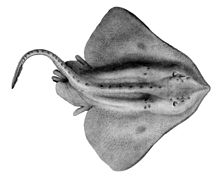Arctic skate
| Arctic skate | |
|---|---|

| |
| Scientific classification | |
| Domain: | Eukaryota |
| Kingdom: | Animalia |
| Phylum: | Chordata |
| Class: | Chondrichthyes |
| Subclass: | Elasmobranchii |
| Order: | Rajiformes |
| Family: | Rajidae |
| Genus: | Amblyraja |
| Species: | A. hyperborea |
| Binomial name | |
| Amblyraja hyperborea (Collett, 1879) | |
The Arctic skate (Amblyraja hyperborea) is a species of fish in the family Rajidae. It lives near the seabed between 140 and 2,500 m deep in the Arctic Ocean and waters around Canada and northern and north-western Europe, in the northern Pacific Ocean, and in waters surrounding Antarctica and New Zealand.[2]
The Arctic skate is about 1 m long and is gray-brown with large dark spots. Its underside is white with dark patterns. It has thorns in line from back to near the end of its tail. It is oviparous; its eggs are capsules with hard horns on each corner. It eats all sorts of small animals at the bottom of the sea.[2]
Taxonomy
This species was first described by Robert Collett in 1879 and named Raja hyperborea.[3]
Conservation
The Arctic skate is classified as being of "least concern" by the IUCN Red List of Threatened Species.[1]
In New Zealand, the Department of Conservation has classified the Arctic skate as "Not Threatened" under the New Zealand Threat Classification System.[4]
References
- ^ a b Kulka, D.W.; Barker, A.S.; Pasolini, P.; Orlov, A.; Walls, R.H.L. (2016). "Amblyraja hyperborea". IUCN Red List of Threatened Species. 2016: e.T63119A68608464. doi:10.2305/IUCN.UK.2016-1.RLTS.T63119A68608464.en. Retrieved 13 November 2021.
- ^ a b "Amblyraja hyperborea summary page". FishBase. Retrieved 2019-01-15.
- ^ Collett, Robert (1879). "Fiske fra Nordhavs-Expeditionens sidste Togt, Sommeren 1878". Forhandlinger I Videnskabs-selskabet I Christiania. 1878: 1–64 – via Biodiversity Heritage Library.
- ^ Duffy, Clinton A. J.; Francis, Malcolm; Dunn, M. R.; Finucci, Brit; Ford, Richard; Hitchmough, Rod; Rolfe, Jeremy (2016). Conservation status of New Zealand chondrichthyans (chimaeras, sharks and rays), 2016 (PDF). Wellington, New Zealand: Department of Conservation. p. 8. ISBN 9781988514628. OCLC 1042901090.

